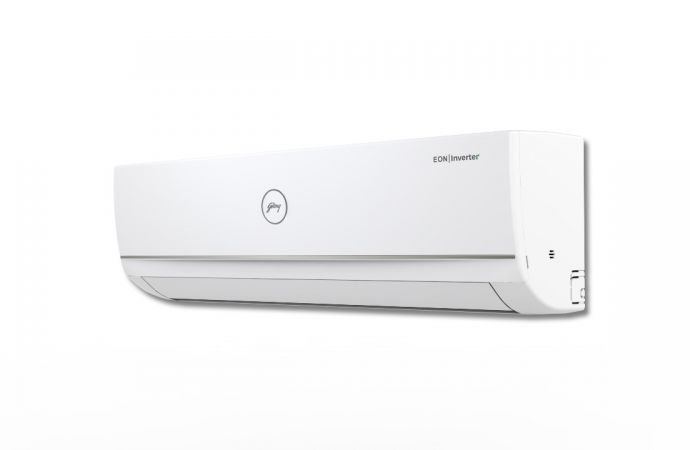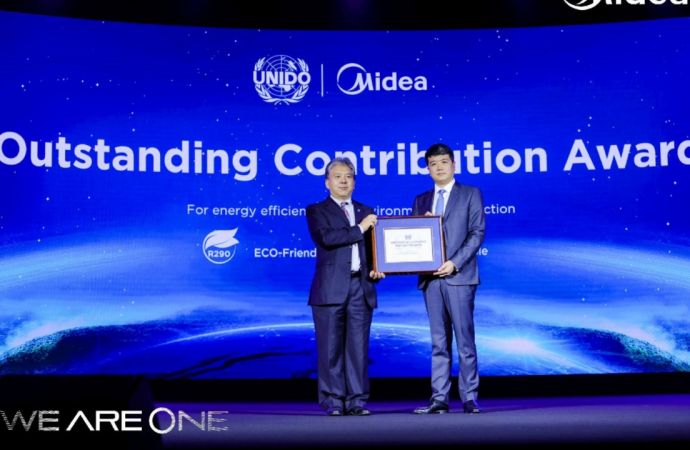The new air conditioning units are available in 5-star energy efficiency rated versions, and are equipped with nano-coated anti-viral filtration technology.

A Godrej AC unit. Credit: Godrej.
India-based manufacturer Godrej Group launched a new series of “super efficient” and 5-star-rated propane (R290) room air conditioners (RACs) last month, adding to its previous R290 RACs.
“Available in super-efficient 5-star energy rating, these are a definite upgrade in terms of energy efficiency over our previous models,” said Santosh Salian, Product Group Head – Air Conditioners, Godrej Appliances.
The new RACs are designed with twin rotary compressors and 100% copper condensing and connecting pipes, giving them “long-term reliability and durability,” according to Salian. The outdoor units are equipped with acoustic jacketing and the indoor units with a brushless direct current (BLDC) motor for silent operation. The RACs also have a sleep mode that ensures comfort through the night.
Salian described the new series as having “heavy duty outdoor units with a higher weight indicating better build and quality and corrosion-resistant blue fin technology in the evaporator and the condenser.”
In addition to India, the RACs are available in the SAARC (South Asian Association for Regional Cooperation) region and in the Caribbean. In the future, Godrej also intends to market the R290 RACs in Europe, Australia and the rest of South Asia.With regards to purchase costs, Salian explained that “prices are higher by almost 15% now [compared to 2012], but it's mostly due to the impact of commodity price inflation, which we have been experiencing in India since November 2020.”
The 100% Made in India air conditioners are produced at Godrej’s Shirwal Plant (near Pune, Maharashtra, India), containing full backward integration with previous models. The new manufacturing line also includes heat exchangers, indoor units backed by plastic injection molding and outdoor units.
Working with R290 is not new to Godrej; the company has included the climate-friendly refrigerant in its portfolio in India since 2012 as one of the world’s leading producers of R290 RACs.
Anti-Viral Technology
The new series, which spans 30 models, are all equipped with a special nano-coated anti-viral filtration technology. This innovation is a self-cleaning technology that inhibits bacterial growth and corrosion. The new technology “eliminates 99.9% viral and bacterial particles meeting the nano coated filter surface, safeguarding consumer health and improving hygiene at home,” Salian said. “The filter continues to retain its efficacy even after 50 washes, during routine maintenance, ensuring that it protects you and your loved ones throughout the life of the air conditioner.”
The new self-cleaning, anti-viral filtration technology is a response to consumer demand for cleaner living spaces brought on by the coronavirus. “The ongoing COVID-19 pandemic has influenced purchase behavior across categories, with consumers seeking better health, hygiene and comfort at home where they are spending a lot more time,” Salian explained, when asked about why Godrej has come up with this new solution, adding that “people are warming up to more sustainable, eco-friendly offerings.”
Global Cooling Prize
Godrej was one of eight finalists in the Global Cooling Prize, where manufacturers competed to create RACs at least five times more energy efficient than the conventional models being traded today.
The company’s candidate completed the testing phase of the competition, though in the end it didn’t win. “Ultimately, in my opinion, [Godrej was] materially hampered by the charge restrictions” on hydrocarbons in residential air conditioners, said Ian Campbell, Senior Fellow at the Rocky Mountain Institute, co-organizer of the competition.
The global standard International Electrotechnical Commission (IEC) IEC 60335-2-40 for RACs is being updated to allow a greater charge of hydrocarbons to be used. A final revised standard is expected to be published by the end of 2021.
“With IEC easing on its safety standards, it will help in expanding the portfolio, in terms of higher tonnage requirements of more than 2TR (7kW) capacity,” Salian explained.
“This will also help with the adoption of these refrigerants [R290] in light commercial products too, benefiting commercial and large institutional customers, while lowering carbon footprint,” he concluded.
Related stories



